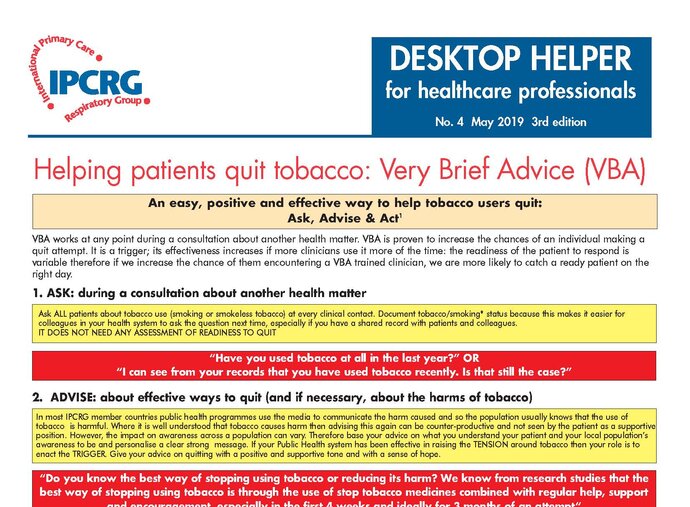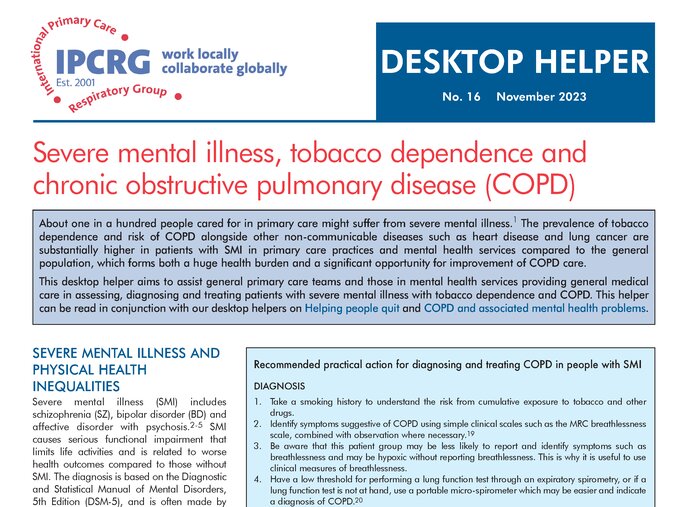Tobacco dependence

IPCRG position
Tobacco dependence is a diagnosable and treatable relapsing chronic condition that often begins in childhood. There is very good evidence about effective treatments in primary care. IPCRG's role is to improve the confidence as well as the competence of primary care and to advocate for investment to improve access to the most effective treatments. We have a range of resources to help including a Desktop helper on helping people quit tobacco that can be adapted for the local availability of specialist services and pharmacotherapy.
Our position statement is peer-reviewed, published by npjPCRM and endorsed by the Member Organisations of World Organization of Family Doctors (WONCA) Europe. This includes discussion about trends and responses to the use of waterpipes, cannabis smoking and chewed tobacco, where there is more uncertainty in terms of best practice.
We have also ran teach the teacher programmes in Uganda and Eastern Europe and will shortly be launching a new e-learning zone.
Why this is important
- Tobacco dependence is a deadly epidemic killing up to half its users - in fact, it may be more like 2/3 of its users (see this paper and this example of its application)
- Currently one billion smokers in the world
- 80% live in low and middle income countries.
- Tobacco use is the leading cause of premature death globally due to the many diseases which are attributed wholly or partially to smoking resulting in nearly six million deaths a year.
- This annual total is higher than the combined mortality from malaria, tuberculosis and human immunodeficiency virus (HIV).
- Based on current trends, tobacco is expected to be responsible for 10% of global deaths, or eight million deaths a year by 2030, 80% in low and middle income countries: this includes a 9% decline in high income, but a doubling in low and middle income to 6.8 million.
- This is creating growing health inequalities at national and global levels due to the strong association of tobacco use with socio-economic deprivation.
What is the primary care role?
- Tobacco control policies have already been very successful, lending force to the World Health Organization’s (WHO) Framework Convention on Tobacco Control (FCTC).
- While public health measures such as raising taxes on cigarettes, plain packaging and advertising controls will prevent many from taking up smoking and encourage some to quit, many of those who are most tobacco dependent will not be able to quit without treatment from a health-care professional.
- Therefore, the FCTC includes a specific article on treating tobacco dependence, Article 14, which argues that cessation support is essential, and will also have a synergistic effect on the other control measures.
- The WHO has also called specifically for smoking cessation to be integrated into primary health care, as it is seen as the most suitable health setting for providing advice and support on smoking cessation globally.
- The WHO Essential Medicines List now includes 3 pharmacotherapies: Nicotine Replacement Therapy (long-acting patch that deals with nicotine withdrawal and short-acting gum that deals with cravings; there are other types of NRT that may be preferred but these aren't on the WHO List); varenicline (safe and effective but currently has supply issues - look out for generic varenicline) and buproprion
- Yet only 15% of the world’s population has access to appropriate cessation support.
- The Sustainable Development Goal we are reaching for is a 30% relative reduction in prevalence of current tobacco use by 2025.
As a primary care organisation, IPCRG advocates for a holistic, bio-psycho-social approach to most problems, and therefore we argue that the starting point is to approach tobacco dependence as an eminently treatable condition. We recognise the need for a hierarchy of interventions depending on time and available resources. We also advocated for an equitable approach to behavioural and drug interventions.
We provide materials for use in primary care education. We also identify priorities where further research is needed, and work with partners to take these forward.



